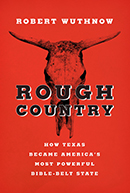
Texas is not just a giant land mass filled with religious people in 10-gallon hats. It is also America’s most influential Bible-belt state. – Photo of Texas Governor Rick Perry by Ed Shipul (http://bit.ly/10HMp56)
When you think of Texas, images of gunslingers and cowpokes and rodeos may come to mind. But Robert Wuthnow, chair of the sociology department at Princeton University, has visions of Texas that stretch well beyond stereotypes. In his new book, “Rough Country: How Texas Became America’s Most Powerful Bible-Belt State,” Wuthnow says that Americans can’t ignore Texas or its religiosity. In fact, the two together create a powerful force that influences us all.
RNS: Give me three good reasons that the Texas’ religion should matter to me or the rest of the country.
RW: The first reason is politics. Rick Perry, Texas’s longest-serving governor, is gearing up for another run at becoming President. Ted Cruz has made more news than any junior senator from his party in recent history. Former Congressman Dick Armey’s Freedom Works significantly contributed to the Tea Party’s national success. These leaders credit religion with guiding their policies and furthering their careers.
Second, understanding the Religious Right requires understanding Texas religion. The story that features Jerry Falwell and Pat Robertson misses a lot. Texas reveals a longer and more complicated trajectory. The Texas story includes prominent conservative preachers favoring Barry Goldwater in 1964, mobilizing opposition to abortion before Roe v. Wade in 1973, supporting Gerald Ford in 1976, giving Ronald Reagan a platform in 1980, and organizing the “bubba vote” for George H.W. Bush in 1988.
Third, the history of American fundamentalism is lopsided without Texas. The standard narrative focuses on northern developments with a few offshoots in the Deep South and Southern California. The Texas story brings the Scofield Bible, dispensational theology, the political activism of fundamentalist J. Frank Norris, and conflicts within the powerful Southern Baptist Convention into clearer focus. Twice as many evangelicals and fundamentalists live in Texas than in any other state.
RNS: You say that Texas has influenced every presidential election for 50 years? Isn’t this just a function of the sheer size of the state?
RW: It is partly a function of size. But New York and California are populous as well and yet have not had the sustained influence on presidential elections that Texas has had. Besides the fact that three of the state’s native sons–LBJ and the two Bushes–were presidents, Texas played a pivotal role in Kennedy’s election in 1960, fueled support for Ford in 1976, helped Reagan win in 1980 and 1984, and in the past decade has provided support for conservative candidates in Republican primaries.
RNS: Name one way Texans influence and view of government has shaped actual public policy and people?
RW: My assistants and I interviewed two hundred clergy and lay leaders in Texas. The interviews revealed something that people of faith in other states should understand. These leaders were not (with a few exceptions) racists. They claimed to care about the poor. But, with their support, socially and fiscally conservative Republicans nearly always won.
African Americans, Hispanics, and lower-income white Anglos more often voted for candidates of the other party who they regarded as more sympathetic toward the poor. Those candidates rarely won. The religious leaders we talked to would not have said they were trying to disenfranchise the poor. But that was the inadvertent consequence.
RNS: Has Texas’ growing Hispanic population made a difference?
RW: It has expanded the state’s Roman Catholic and Pentecostal churches, thus adding to the state’s religious diversity. The Hispanic vote has been heavily Democratic, reinforcing speculation that Texas politics are trending purple, if not blue. However, gerrymandering and what critics describe as voter suppression have substantially weakened that trend. The white Anglo evangelical Protestant vote has been heavily Republican.
RNS: Despite influencing it, many Texans resent the federal government. How has this bled over into the rest of the country?
RW: Texas was an independent republic before it was a state, which puts the twinkle in their eyes when leaders–half in jest– remark about secession. Resentment toward the federal government dates especially to Reconstruction and continued during the long decades of frontier settlement when citizens largely had to develop their own grassroots institutions. The Depression and the New Deal modified that sentiment somewhat, but the oil interests that became influential in the state increasingly resisted federal intervention in the form of taxes and regulations.
Protecting religious freedom has been an important part of the story as well. Texas leaders can argue–sometimes persuasively–that other states and the US as a whole would flourish economically and perhaps morally if the size of government was scaled back and good-hearted citizens were left to fend for themselves.
*RELATED: For more info on the religious diversity of Texas and other states, check out the new PRRI/SSRS “American Values Atlas” at http://ava.publicreligion.org
**AND JUST FOR FUN … TAKE IT AWAY WILLIE!






